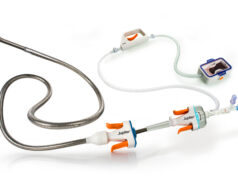Results of the EINSTEIN-PE study have shown that the oral anticoagulant rivaroxaban (Xarelto, Janssen and Bayer Healthcare) was comparable to today’s standard of care in treating patients with acute symptomatic pulmonary embolism and in preventing development of venous thromboembolism. The study also found rivaroxaban had a similar safety profile and significantly lower risk of major bleeding versus the current standard regimen. These data were presented as a late breaking clinical trial at the American College of Cardiology Annual Scientific Sessions, and published in the New England Journal of Medicine.
The EINSTEIN-PE study compared rivaroxaban to enoxaparin followed by vitamin K antagonist in the treatment of 4,833 patients with acute symptomatic pulmonary embolism for the prevention of recurrent venous thromboembolism. Patients received treatment for three, six or 12 months. In the study, rivaroxaban succeeded in demonstrating non-inferiority to standard therapy for the primary endpoint of recurrent symptomatic venous thromboembolism, a composite of symptomatic deep vein thrombosis and non-fatal or fatal pulmonary embolism (2.1% vs. 1.8%, respectively [p=0.003 for non-inferiority]). Rivaroxaban also demonstrated similar results compared to standard of care for the principal safety outcome measuring a composite of major and non-major clinically relevant bleeding events (10.3% vs. 11.4%, p=0.23, respectively). Rivaroxaban treatment also resulted in a significant reduction in major bleeding events (1.1% vs. 2.2%, p=0.003, respectively) compared to standard therapy.
The treatment of venous thromboembolism currently requires a two drug regimen: a rapidly acting, injectable anticoagulant followed by long-term treatment with an oral vitamin K antagonist such as warfarin. According to Jack E Ansell, professor of Medicine at New York University School of Medicine and chairman of the Department of Medicine at Lenox Hill Hospital in New York, “these results demonstrate that a single-drug approach like oral rivaroxaban could be an important addition to our ability to simplify treatment by eliminating the need to transition to a different anticoagulant while preventing the occurrence of secondary blood clots in patients who have pulmonary emboli.”
“The average patient with venous thromboembolism carries the risk of recurrence for a year after the initial event and, for some patients, the risk can persist beyond that,” said Paul Burton, vice president, Cardiovascular Franchise Medical Leader at Janssen. “Based on the results seen in the EINSTEIN-PE study, rivaroxaban could provide an alternative, effective oral treatment that offers less risk of major bleeding for patients who have been diagnosed with a pulmonary embolism. Given that pulmonary embolism requires both acute management in a hospital setting and long-term treatment at home, an oral, single-drug treatment that does not require routine blood monitoring may be especially welcome.”
The company plans to file the EINSTEIN studies in a supplemental New Drug Application with the FDA during the second quarter of this year.









